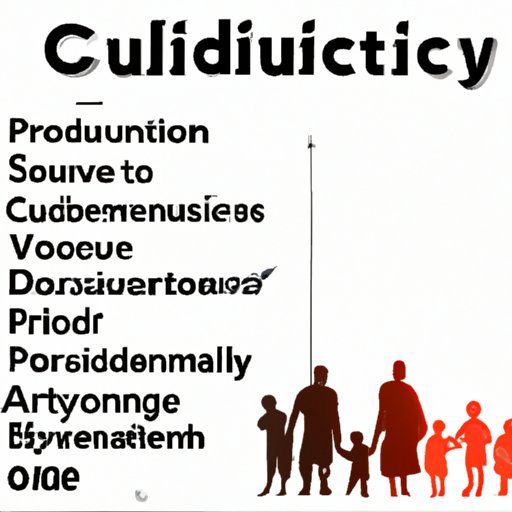Introduction
The concept of a “culture of poverty” has been used for decades to explain why some people remain in poverty despite efforts to improve their economic situation. This term refers to a set of values, attitudes, and beliefs shared by individuals who are living in poverty. These attitudes and beliefs are believed to be passed down from one generation to another, making it difficult for those living in poverty to escape their current circumstances.
Analyzing the Causes and Consequences of a Culture of Poverty
A culture of poverty can be caused by a variety of social and economic factors. Low income, limited educational opportunities, and poor quality housing can all contribute to a culture of poverty, as they make it difficult for individuals to break out of their current situation. In addition, high unemployment rates can further exacerbate the problem, as individuals may struggle to find gainful employment.
The impact of a culture of poverty on communities can be severe. Studies have shown that areas with higher levels of poverty tend to have higher crime rates than more affluent areas. Additionally, there is a direct correlation between poverty and health outcomes, with individuals living in poverty having worse overall health than those living in higher-income areas. Finally, a culture of poverty can lead to reduced economic mobility, as individuals may find it difficult to move up the socio-economic ladder due to lack of resources and access to opportunity.

Exploring the Role of Education in Breaking the Cycle of Poverty
Education plays an important role in breaking the cycle of poverty. Access to quality education can provide individuals with the tools they need to succeed in life. Early intervention programs, such as Head Start and Pre-K, can help prepare children for success in school and life. Post-secondary education can also be beneficial, as it can provide individuals with the skills and knowledge necessary to find meaningful employment.
In addition to providing individuals with the skills and knowledge necessary for success, education can also increase self-confidence and resilience. Studies have found that individuals with higher levels of education are more likely to have positive outlooks on life, which can help them to overcome obstacles and achieve their goals.

Investigating Intergenerational Transmission of Poverty
Intergenerational transmission of poverty is another factor that contributes to a culture of poverty. This occurs when individuals from one generation experience poverty, and then pass this experience on to the next generation. This can create a cycle of poverty that is difficult to break.
Understanding the dynamics of intergenerational poverty can help us to better address the issue. Examining the role of parenting practices can provide insight into how poverty is transmitted from one generation to the next. Policies that focus on increasing access to quality education and job training can also help to reduce intergenerational transmission of poverty.
Conclusion
A culture of poverty is a complex phenomenon that can have far-reaching consequences for individuals, families, and communities. Social and economic factors, such as low income, limited educational opportunities, and poor quality housing, can contribute to a culture of poverty. Additionally, intergenerational transmission of poverty can make it difficult for individuals to escape their current circumstances.
Education is essential for breaking the cycle of poverty. Access to quality education can provide individuals with the tools they need to succeed in life. Early intervention programs, post-secondary education, and policies aimed at reducing intergenerational transmission of poverty can all help to create a more equitable society.
(Note: Is this article not meeting your expectations? Do you have knowledge or insights to share? Unlock new opportunities and expand your reach by joining our authors team. Click Registration to join us and share your expertise with our readers.)
